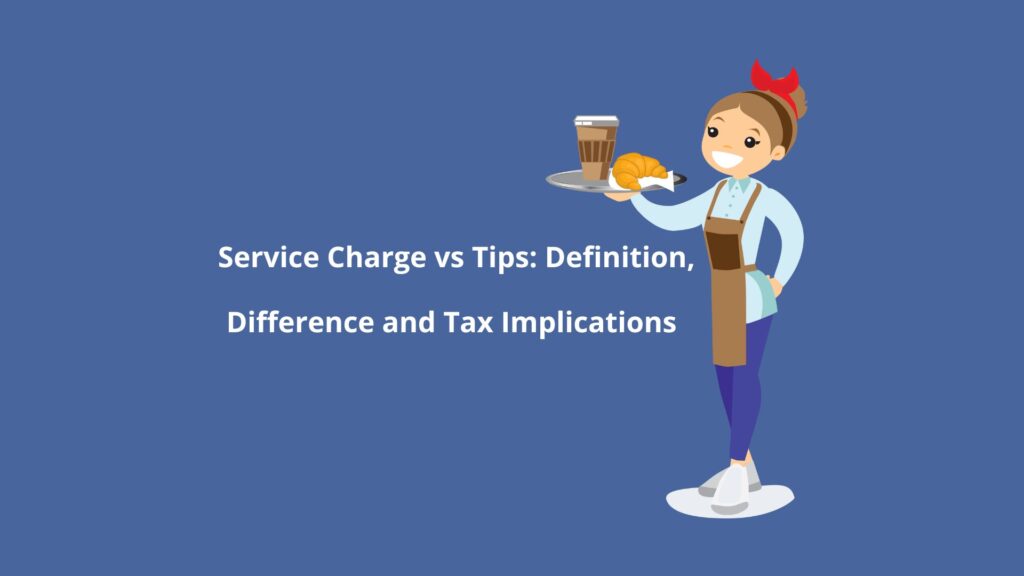According to the IRS Revenue Ruling 2012–18, tips and service charges are two different things that have their own tax implications. To compensate employees and offset growing costs, restaurants in the United States have recently begun to charge service fees directly to the bill, ranging from 20% to 22%.
Do these fees actually follow the same rules for tax purposes as the normal tips do? Or, are they treated differently when reporting to the IRS?
Let’s see how both differ, and how to properly report these to the IRS.

What is a Service Charge?
Service charges are levied by hotels, restaurants, buses, or travel companies in exchange for providing their services to customers. Here are some basic parameters:
- The amount of service charges is not negotiable.
- These are fixed charges included in the bill that a customer must pay
- The amount must be recorded as revenue in the financial statements
- The customer has a right to see the number of service charges being paid
- The customer has a right to see where the money is going
Service Charge Examples
Examples of service charges include paying a fee for:
- Dining in a restaurant (kitchen love, service fee)
- Hosting private parties through an event planner
- Going on private trips through a travel agency
All of these companies charge a certain amount of fee, which is mandatory for the customer to pay.
What is a Tip?
Tips are payments made by a customer to an employee, determined by the customer and though expected, are not technically required by the establishment. Customers pay these tips as a gratuity for the service the employees provide.
The IRS defines tips as:
- The customer pays the tip voluntarily and decides the amount
- A tip can be in the form of cash items such as money, or an addition to a debit or credit card transaction
- Though uncharacteristic, a tip can be in the form of any non-cash items such as coupons or gifts.
When an employee gets a tip, they must report it to the employer to maintain the payroll tax record. These tips are then distributed among the directly and indirectly tipped employees, like waiters, dishwashers, etc.
If the tips of an employee exceed more than $20 in a month, then the employee is liable to pay Federal Unemployment Tax Act (FUTA) taxes.
Social security tax, Medicare tax, and federal income tax are applicable only to the wages of tipped employees. All the tips and payroll taxes can be filed by using Form W-2 and Form 941.
Tip Example
Imagine yourself having a fine meal in a restaurant. After the meal, you might feel like tipping your waiter for the hospitality that he provided. So, you pay $10 to him as a gratuity for his service on your own. This amount is not included in the bill, and is sometimes in addition to a service charge. Another example of a tip is handing a bellhop cash or leaving behind a tip for housekeeping after leaving a hotel.
Are There Any Taxes for Service Charges and Tips?
Yes, service charges and tips are subject to tax. These are forms of income for an employee, which is why they are taxed under payroll tax laws. An employee must pay Federal income tax and FICA tax on his/her wage. Service charges will have different tax implications depending on how they are distributed (i.e. if they go to staff wages or a portion of the charge goes to operating costs).
The IRS Rule to Report Tips
The IRS requires employees to track their tips by maintaining a daily tip record. The employee must report these tips to the employer every month. This helps with filing the individual tax return when the year ends.
The IRS rules to report tips are as follows
- Cash tips including money received from the customer are added to the employee’s gross income
- Cash tips are only recorded when the total tip amount exceeds $20 for an employee
- non-cash items are not supposed to be reported to an employer but are added to the employer’s gross income
- Directly tipped and Indirectly tipped employees are subject to report their tips to the employer
The IRS Rules to Report Service Charges
Service charges are charged directly to the bill. This is a non-tip income that the employers are tracking. When these service charges are distributed among the employees, they are treated as regular income for the employees.
This income is subject to similar payroll tax laws. More information about service charge tax laws can be found in IRS fact sheet publication 15.
Distributed service charges must be reported on the employee’s Form W-2 in Box 1, which includes wages, tips, and other compensation; Box 3, which includes Social Security wages; and Box 5, which includes Medicare earnings and tips.
Do You Still Have a Question?
If you are providing tips directly with the service charges, these are not categorized as tips under the definition of the IRS since you don’t have the option to refuse them. Service Charges have been around for some time, but as they are growing in popularity, it’s probably best to speak to an experienced CPA who can advise you properly.
Moreover, if you have any other questions or concerns regarding the service charges, tips, and tax implications, please consult with an experienced CPA.
